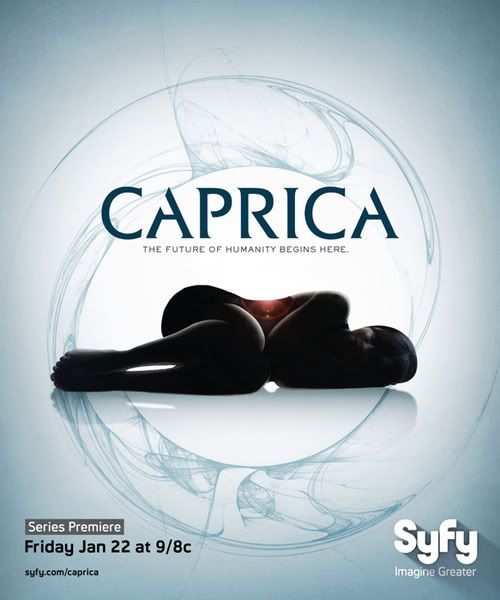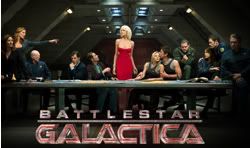The New York Times has an interesting article by Alessandra Stanley about all the cool and smart TV shows around these days, that inspire conversation, like Battlestar Galactica, Lost, Mad Men, House, and others:
It’s a rich television age and a demanding one. The selection is now so plentiful and fragmented and good. And deciding among hundreds of channels, on-demand options, DVR, Internet streaming and iPhones requires so much research, planning and commitment that viewers have become proprietary about their choices. Alliances are formed, and so are antipathies. Snobbery takes root. Preferences turn totemic. The mass audience splintered long ago; now viewers are divided into tribes with their own rituals and rites of passage.
....Science fiction is one thing: “Battlestar Galactica” has intellectual cachet.
“The humans are pagan polytheists and the robots are monotheists, whose divine jihad is against the humans (even though the former know that the latter created them),” Anthony Gottlieb, the author of “The Dream of Reason: A History of Philosophy from the Greeks to the Renaissance,” explained off the top of his Blackberry from an airport baggage claim. “There’s a curious mix of high-tech and superstition and scriptural fundamentalism (which interestingly suggests that religion is ineradicable, as today’s theorists of secularism are increasingly saying).”
Mr. Gottlieb likes the philosophical puzzles (“Some of the robots think they are human, and some of the humans fear they may be robots”) as well as the way the show switches sympathies back and forth from democracy to dictatorship. He really had only one objection. “There’s lots of romance, though this bores me,” he typed. “Less kissing, more killing is a frequent internal refrain of mine.”
This summer “Mad Men,” rippled across my world in ever-widening circles of connoisseurship. We were entranced by the amber-colored look at the early 1960s, when men drank martinis at lunch, and housewives smoked at P.T.A. meetings, and the battle between the sexes had barely begun. Michael Hainey, the deputy editor of GQ, is enamored of the way the series captures the finer details in a lost moment of American overconfidence. “It’s a period piece that’s about right now,” Mr. Hainey explained. He also loves the show’s look and feel, which he described as “ ‘The Apartment’ meets ‘The Spy Who Came in From the Cold.’ ”
...Before the Internet, iPhones and flash drives, people jousted over who was into the Pixies when they were still a garage band or who could most lengthily argue the merits of Oasis versus Blur. Now, for all but hardcore rock aficionados, one-upmanship is more likely to center around a television series — like metaphysical clues buried in “Lost,” whether the current “Battlestar Galactica” is an affront to the 1978 original (some bloggers sneeringly refer to the current incarnation as Gino, short for “Galactica in name only” ) or who discovered “Flight of the Conchords” when it was a comedy team performing in concerts, not an HBO series.
Television used to be dismissed by elitists as the idiot box, a sea of mediocrity that drowns thought and intelligent debate. Now people who ignore its pools and eddies of excellence do so at their own peril. They are missing out on the main topic of conversation at their own table.
Check out the whole article at The New York Times.






No comments:
Post a Comment